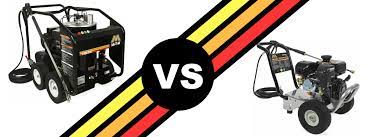Hot Water vs. Cold Water Pressure Washers: Which Is Right for You?

Are you in the market for a pressure washer but not sure whether to go with hot water or cold water. There’s no denying that both have their benefits, but which one is right for you depends on your specific cleaning needs. In this blog post, we’ll explore the pros and cons of each type and help you make an informed decision. So sit back, relax, and get ready to learn about the differences between hot water and cold water pressure washers!
Hot water pressure washers are ideal for heavy-duty cleaning jobs that require extra power. The hot water helps to loosen and remove tough dirt, grime, and grease. Hot water pressure washers also have the advantage of being able to clean at lower pressures than cold water models, which can help to avoid damage surfaces.
However, hot water pressure washers are more expensive than cold water models, and they require more maintenance. They also use more energy and generate more noise. If you’re looking for a powerful pressure washer for occasional use, a hot water model may be the right choice for you.
Cold water pressure washers are less expensive than hot water models and they’re typically easier to operate and maintain. They’re also quieter and use less energy. Cold water pressure washers are best for light-duty cleaning tasks such as washing vehicles or removing mud from sidewalks.
If you plan on using your pressure washer frequently or for tougher cleaning jobs, a hot water model may be the better option. However, if you’re looking for an affordable and easy-to-use machine for light-duty tasks around the home
What Are Pressure Washers?
Pressure washers use high-pressure water to clean surfaces. They are commonly used to clean driveways, sidewalks, decks, and patios. There are two types of pressure washers: hot water pressure washers and cold water pressure washers.
Hot water pressure washers use hot water to remove dirt, grease, and grime. Hot water is more effective than cold water at breaking down tough stains and removing stubborn dirt. However, hot water pressure washers can damage delicate surfaces and cause injuries if not used correctly.
Cold water pressure washers use cold water to remove dirt, grease, and grime. Cold water is less effective than hot water at breaking down tough stains and removing stubborn dirt. However, cold water pressure washers are safer to use on delicate surfaces and cause less damage if not used correctly.
Hot Water vs. Cold Water Pressure Washers: Pros and Cons
If you’re considering to purchasing a pressure washer. You may be wondering whether a hot water or cold water model is right for you. Below, we’ll go over the pros and cons of each type of pressure washer so that you can make an informed decision.
Hot water pressure washers are ideal for removing stubborn dirt and grime. The hot water helps to loosen up these tough deposits so that they can be easily rinsed away. Hot water pressure washers also kill bacteria and viruses, making them ideal for use in food service applications. However, hot water pressure washers are more expensive than their cold water counterparts and require more maintenance.
Cold water pressure washers are less expensive than hot water models and are typically easier to maintain. They’re also better suited for cleaning delicate surfaces since the cold water won’t damage them. However, cold water pressure washers don’t work as well as hot water models when it comes to removing stubborn dirt and grime.
Benefits of Using a Hot Water or Cold Water Pressure Washer
If you are wondering whether a hot water or cold water pressure washer is right for you, few things to consider. Each type of pressure washer has its own set of benefits that may make it the better choice for your needs.
Hot water pressure washers are ideal for removing stubborn dirt and grime. The hot water loosens up the dirt and grime, making it easier to blast away with the high-pressure. Hot water pressure washers also do a great job of killing bacteria and other germs, making them ideal for cleaning areas that need to be sterilized.
Cold water pressure washers are less likely to damage delicate surfaces and can be used on a wider range of materials. They are also better for general purpose cleaning since they don’t rely on heat to loosen up dirt and grime.
Common Uses for Each Type of Pressure Washer
Hot water pressure washers are most commonly used in industrial and commercial settings, where they are used for tasks such as cleaning heavy machinery, vehicles, and floors.
Cold water pressure washers are more used in residential settings, where they are used for tasks such as cleaning driveways, decks, and patios.
Tips for Choosing the Right Type of Pressure Washer
If you’re in the market for a pressure washer, you may be wondering whether a hot water or cold water model is right for you. Here are some tips to help you choose the right type of pressure washer for your needs:
– Consider the type of cleaning you’ll be doing. Hot water pressure washers are better suited for heavy-duty cleaning jobs, like removing grease and grime. Cold water pressure washers are better for lighter jobs, like washing your car or deck.
-Think about the temperature of the water you’ll be using. If you’ll be using your pressure washer in an area with very hot temperatures, a hot water model may be a better option.
– Consider the cost of operating each type of pressure washer. Hot water pressure washers typically cost more to operate than cold water models, due to the increased energy usage.
Conclusion
As you can see, both hot water and cold water pressure washers have their own benefits. When choosing which one is right for you. It’s important to consider the type of job that needs to be done and the desired results. Hot water pressure washers are best suited for heavy-duty cleaning jobs. While cold water pressure washers are better suited for lighter tasks such as washing cars or decks. Keep in mind that no matter what type of pressure washer you choose, safety should always be a top priority.
